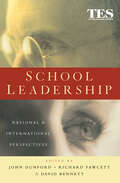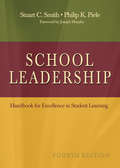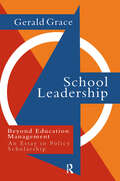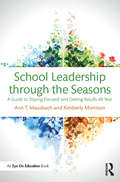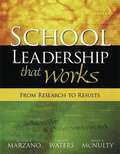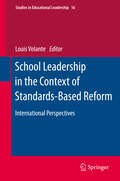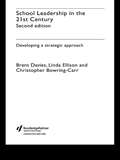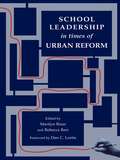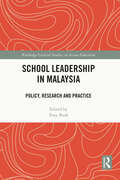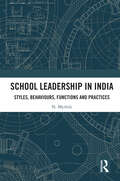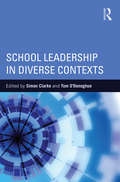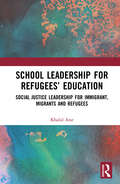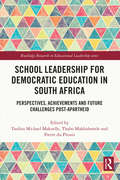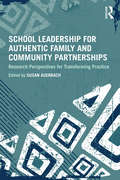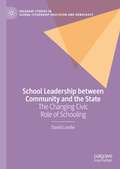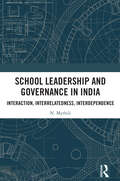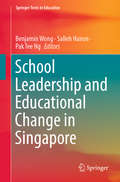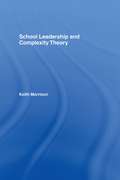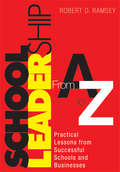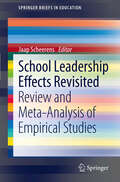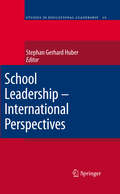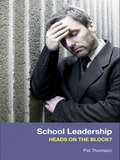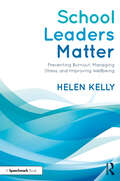- Table View
- List View
School Leadership: National and International Perspectives (School Leadership And Management Ser.)
by David Bennett John Dunford Richard FawcettThis work challenges the notion that there is "one right way" to approach school leadership. Presenting key policies and approaches to organization and management of 14 school leaders from the UK and internationally, it seeks to reflect the diversity of approaches possible in given situations.
School Leadership: Handbook for Excellence in Student Learning
by Stuart C. Smith Philip K PieleEmphasizing the school leader's role in student learning, this new edition covers the principalship, accountability, leadership effects, distributed leadership, political leadership, resource allocation, and more!
School Leadership: Beyond Education Management
by Gerald Grace Professor Gerald GraceThis text provides a study of the education policy scholarship of leadership. It examines the ways in which concepts of educational leadership and management have evolved historically and culturally, reviewing contemporary debates about the nature of school leadership.; The question of what school leadership could and should be is at the centre of political, ideological and educational debate in many societies. These debates involve cultural conservatives, New Right marketeers, democrats and community educators, feminists and critical theorists as well as school governors, headteachers and teachers, parents, community members and school students.; These debates are reviewed and the theoretical context is illuminated by fieldwork accounts derived from the research participation of 88 headteachers working in English schools, both primary and secondary. Such accounts provide an insight into the challenges of contemporary school leadership as headteachers face new power relationships, new curriculum responsibilities and management and marketing cultures which generate moral, ethical and professional dilemmas for many of them.
School Leadership, Citizenship Education and Politics in China
by Shuqin XuThis book examines and theorizes the dynamics and complexities of leadership in citizenship education in junior secondary schools in Shanghai, China. Specifically, it examines from a macro- and micro-political theoretical perspective the interactions between principals and school party secretaries (SPSs), and how they respond to the demands of macro- and micro-political actors. This qualitative empirical research found four major school leadership/citizenship education scenarios in which principals and SPSs addressed the interests of different macro- and micro-political actors. Moreover, principals and SPSs enjoyed a complicated working relationship at the micro-political (school) level in which they collaborated to fulfill their responsibilities and respond to school macro- and micro-political actors, while competing for power over leadership in citizenship education. Principals' and SPSs' leadership in citizenship education was shaped by inter-related factors, including diverse influences in a multi-leveled world, the integration of politics and education, the demands of macro- and micro-political actors, and personal factors. To interpret these findings, this study proposes a theoretical framework for understanding leadership in citizenship education in China as a political exercise. This theoretical framework is useful for understanding the complexity of school and citizenship education leadership, the micro-political relationship between Chinese principals and SPSs, and their dynamic and complex interactions with macro- and micro-political actors.
School Leadership through the Seasons: A Guide to Staying Focused and Getting Results All Year
by Ann T. Mausbach Kimberly MorrisonThis book offers key tools and tactics that help school leaders navigate the complex and busy work of improving a school, allowing them to maintain success during the full calendar year. Through practical guidance and "Have to Do" strategies, School Leadership through the Seasons breaks down the challenges of leading a school into manageable steps that align with the seasons of the year. After reading this book, you’ll be able to: implement school improvement processes at high levels, build a culture and climate that promotes safety and learning, and respond to student and staff needs.
School Leadership that Works: From Research to Results
by Robert J. Marzano Timothy Waters Brian A. McnultyWhat does research tell us about the effects of school leadership on student achievement? What specific leadership practices make a real difference in school effectiveness? How should school leaders use these practices in their day-to-day management of schools and during the stressful times that accompany major change initiatives? Robert J. Marzano, Timothy Waters, and Brian A. McNulty provide answers to these and other questions in School Leadership That Works.
School Leadership in the Context of Standards-Based Reform
by Louis Volante"Although standards-based reform emerged in the United States and the United Kingdom, the idea has spread across the world, as an approach to systemic reform. It might appear that there is a world-wide "tsunami" of standards-based reform that will standardize and homogenize the educational system across the globe. This volume makes it very clear, however, that there is no one approach to standards-based reform and countries change - there is a danger in paying attention to its evolution and impact in only one context. That's what makes this volume so valuable. Louis Volante has drawn together descriptions from a wide range of countries, all involved in large-scale reform and using standards and assessments as part of their process. What becomes very obvious is that the language may be the same but the words reflect different contexts and can represent very different ideals, values, and processes. I'm sure you will find this book as interesting and challenging as I have - a gem that pushes your thinking and does not allow readers to remain neutral." (Lorna Earl)
School Leadership in the 21st Century
by Brent Davies Christopher Bowring-Carr Linda EllisonEducation reform continues to be a dominating feature of education in the UK and many other countries throughout the world. As a result of this, it is now more important than ever that headteachers and school managers develop the skills which enable them to manage their new responsibilities effectively. In School Leadership in the 21st Century all the major aspects of school leadership are discussed, including: the strategic and ethical dimensions of leadership leading and managing change leading and managing staff in high performance schools information for student learning and organisational learning transformation of schools in the tewnty-first century. The authors of this completely updated and revised edition have addressed the new standards and competency frameworks, making this an essential read for all headteachers and aspiring headteachers on NPQH or LPSH courses and anyone else with an interest in school leadership.
School Leadership in Times of Urban Reform (Topics In Educational Leadership Ser.)
by Rebecca Barr Marilyn BizarDeveloped in response to the growing interest in examining individual schools as they undergo change, this book features eight case studies of urban elementary and high schools as they face problems and attempt to find solutions in their quest to reform themselves. The cases, with all their pitfalls and problems, provide examples of the very bumpy road of change and of the individual school cultures that sometimes support and often impede reform. Told in the individual voices of various school leaders, the narratives reflect the inevitable biases of people immersed in their work. Their richness derives from the passion with which these stories are told. Textured and complex, these chronicles invite readers to think deeply about the many layers involved in the process of changing schools. School Leadership in Times of Urban Reform is a powerful text for courses in educational leadership, school reform, and the politics of education. Engaging pedagogical features at the end of each case facilitate its use: *Each case ends with an "Analysis of Leadership" section and "Extended Thinking" questions and activities. *Sections 2-5 conclude with "Reflections" to help the reader uncover the major themes and issues. Section 1 is an introductory analysis of reform and school leadership; it provides a frame of reference for examining the case studies that follow. Sections 2-5 are organized around eight case studies (two per section) that address questions of how the leadership roles of school principals and teachers have been shaped by the reform initiative; how parents and local communities have contributed to school reform; and how the culture of the school, and teaching and learning, have been shaped by reform. The final section synthesizes and analyzes what the authors have learned through these cases concerning the leadership roles of principals, parents, community members, and teachers during the period of reform; how the cultures of schools changed as reform progressed; and how reform impacted the instructional practices of teachers and the learning of students.
School Leadership in Malaysia: Policy, Research and Practice (Routledge Critical Studies in Asian Education)
by Tony BushThis new book provides a comprehensive overview of school leadership in Malaysia, at a time when effective leadership is widely recognised to be an essential component of successful schools. It is also timely because leadership is regarded as a vital element in the Government’s ambitious educational reform agenda. The book is edited by a world leader in this field and includes contributors with deeply embedded understanding of the Malaysian schools’ context, based on engagement with policy, practice and research. The book addresses major aspects of school leadership, including instructional and distributed leadership, the role of the principal, the work of senior and middle leaders, professional learning communities, leadership and student outcomes, and leadership preparation. This book is essential reading for postgraduate students and researchers interested in educational leadership and management, and school reform, in an Asian context. It is also recommended for school leaders wishing to engage with policy, practice and research.
School Leadership in India: Styles, Behaviours, Functions and Practices
by N. MythiliThis book explores how school leadership plays a significant role in addressing the issues of poor learning among students in India. It presents in-depth discussions on critical leadership practices that are influenced by the interaction between leadership styles, functions, behaviours and practices of school leaders using theoretical discourse. Besides, a conceptual framework is developed to understand the leadership phenomenon in the Indian context for the overall improvement of schools, student learning and self-development of leaders. While highlighting the issues and challenges faced by schools and school leaders, the book presents a number of vignettes created from the data on various aspects of school leadership practices indicating the styles, behaviours and functions in every chapter. The nature of the analysis is also unique to the discourse on educational leadership as it culminates in tracing the path traversed by the school leaders. The analysis is thematically organised into purpose-process-outcome that spreads across seven chapters. Besides the rigour of vast data that substantiates the arguments using mixed methods, it also vividly discusses the national initiatives undertaken in India to transform instructional and pedagogical leadership of principals and improve students learning in the past one decade or so.The book will be of interest to researchers of education, leadership education and development and school education in university departments of education, management, public administration, development studies and sociology that use interdisciplinary approaches. It will also be useful for school educators, academicians, school leaders, policymakers and teacher educators not only for teaching and research but also for school leadership development for practitioners.
School Leadership in Diverse Contexts
by Simon Clarke Tom O'DonoghueSchool Leadership in Diverse Contexts demonstrates the centrality of context to understanding school leadership. It offers varied portrayals of leadership in a diverse range of distinct settings. Each chapter highlights the prominence of context in understanding the realities of school leadership, focusing on issues and influences that school leaders face, strategies school leaders adopt to deal with the complexities of their work, and conceptualisations of school leadership relevant to the context. An impressive array of international experts examine this neglected area of research by considering school leadership in nine heterogeneous contexts, providing rich and varied portrayals of school leadership and suggesting ways in which the leadership may be enhanced. School Leadership in Diverse Contexts is an ideal book for undergraduate and postgraduate students, particularly those studying units in educational leadership, comparative education and educational policy. Similarly undergraduate and postgraduate students engaged with development studies, history, sociology, law, human geography will be attracted to this text.
School Leadership for Refugees’ Education: Social Justice Leadership for Immigrant, Migrants and Refugees
by Khalid ArarSchool Leadership for Refugees’ Education examines how educational leaders shape and lead different practices to meet refugee students' educational needs, while also considering issues of equity and social justice. It presents cutting-edge theoretical understanding and rich first-hand research findings, which point out the local idiosyncrasies and cross-national themes involved in leading welcoming schools for newcomers. The book provides a global analysis of policy guidelines and up-to-date research findings concerning refugee education. Vast populations have been forced to leave their homelands in recent years due to war, political conflict and economic collapse. The countries that provide sanctuary need to ensure quality education that will allow these destitute but hopeful children to build a new future. Through this book a comprehensive model is presented to guide culturally relevant educational leadership to welcome newcomers in their schools and society. This book will be of great interest for academics, researchers, and postgraduate students in the fields of educational leadership, social justice education and educational administration.
School Leadership for Democratic Education in South Africa: Perspectives, Achievements and Future Challenges Post-Apartheid (Routledge Research in Educational Leadership)
by Tsediso Michael Makoelle Thabo Makhalemele Pierre Du PlessisSchool Leadership for Democratic Education in South Africa explores the democratization and modernization of education in South Africa, analyzing the state of school leadership in South African schools from the time of the new democratic education dispensation in 1994 to the present day. The book maps out what the future of education in South Africa could look like and explores the most conducive educational environments for change in South African schools. It adopts a critical approach to analyzing leadership and management in the context of school governance, school effectiveness, teacher development, multiculturalism and equity in education. Contributions explore the democratization and modernization of education in South Africa through examining different perspectives, achievements and challenges, and also consider issues around access to technology, language policy and the curriculum along with new literature on selected aspects of leadership. This book will be of great interest for researchers, scholars, and students in the fields of educational leadership, sociology of education, and teacher education.
School Leadership for Authentic Family and Community Partnerships: Research Perspectives for Transforming Practice
by Susan AuerbachSchool leaders are increasingly called upon to pursue meaningful partnerships with families and community groups, yet many leaders are unprepared to meet the challenges of partnerships, to cross cultural boundaries, or to be accountable to the community. Alliances are needed among educators, families, and community groups that value relationship building, dialogue, and power-sharing as part of socially just, democratic schools. This book brings together research perspectives that intersect the fields of leadership and partnerships to inform and inspire more authentic collaboration. Contributors from the fields of educational leadership, family engagement, school-community partnerships, and education for social justice come together to examine the role of educational leaders in promoting partnerships as a dimension of leadership for social justice. The volume offers a mix of empirical, conceptual, and reflective chapters with research representing qualitative, quantitative, and mixed methods approaches in urban, suburban, and rural schools. The chapter, "Conversations with Community-Oriented Leaders," includes candid advice from district and school-level administrators on this under-documented aspect of leadership. Situating leadership for partnerships within the leadership literature, this book proposes a model for addressing tensions embedded in home-school relations and leading schools toward more authentic relationships with stakeholders. This collection of original scholarly articles will be a unique resource for new and aspiring administrators and for researchers in both the fields of leadership and school-family-community partnerships.
School Leadership between Community and the State: The Changing Civic Role of Schooling (Palgrave Studies in Global Citizenship Education and Democracy)
by David LundieThis book presents changes in UK and global educational governance in the context of a radical shift in the operating logics of politics and its interaction with education. Beginning from the colonial origins of political interest in education, the author traces a fundamental shift in the patterns of governance of schools in England in the opening decades of the 21st century. Operating through the logics of public choice economics involving both real markets and quasi-markets, policy reforms have increasingly framed school values, and the value of schooling, in line with a politically determined and nostalgic discourse of ‘British values’. This stands in contrast to a previous focus on ‘community cohesion’ which foregrounded school partnership with the parent community and wider society. Tracing the processes and mid-level actors mediating between government and school leaders, the author identifies processes of recontextualisation through which policy can be reinscribed and resisted.
School Leadership and Governance in India: Interaction, Interrelatedness, Interdependence
by N. MythiliThis book explores school processes that shape student learning and principals’ leadership. It uses an interdisciplinary approach by applying the complexity governance and leadership theories drawn from public administration and leadership discourse in education. The strength of this book lies in identifying the latent processes that determine governance and leadership using interaction, inter-relatedness and interdependence through explanation building used in advanced qualitative analysis which hitherto rarely used in education. For this purpose, it first draws organised data developed as leadership function-behaviour interaction in the book School leadership in India: Styles, functions, behaviours and practices written by the same author and published by Routledge in 2025. Another important feature of the volume is how it applies robust theories drawing from public administration and educational leadership using an interdisciplinary approach that was rare to find in studying school governance and leadership.This book will be of interest to researchers, academicians working in the area of educational leadership and management, school and teacher education in universities, research institutes, think-tanks working on education policy, good governance and public policy in general. It is also relevant in management institutes, public administration, development studies and public policy in universities.
School Leadership and Educational Change in Singapore (Springer Texts in Education)
by Benjamin Wong Pak Tee Ng Salleh HaironThis book provides readers with insights into how Singapore school leaders are actively engaged in the transformation of the Singapore education system. It brings to attention crucial elucidations of the increasing demand and complexity placed on school leaders through the use of case studies. Each chapter in the book focuses on a particular issue which has become important or has gained renewed importance in the Singapore education system. The chapters first provide a background to the theme under examination and a theoretical basis for discussion. They then narrate the case that shows how school leaders interpret and implement policy initiatives in their respective schools or lead change in that area. The case studies span over a wide range of domains such as instructional leadership, assessment leadership, stakeholder engagement, professional learning communities, and school branding. The data collected from these case studies came primarily from interviews of educators in their respective school contexts, in addition to other sources of data such as artifacts. Each case study highlights descriptions, interpretations, and perspectives across school contexts, which is consistent with the proposition that school leadership is very much shaped by context. At the end of each chapter, there are guiding questions to help readers critically analyse and reflect on the main learning points of the case.
School Leadership and Complexity Theory
by Keith MorrisonInterest in complexity theory, a relation of chaos theory, has become well established in the business community in recent years. Complexity theory argues that systems are complex interactions of many parts which cannot be predicted by accepted linear equations. In this book, Keith Morrison introduces complexity theory to the world of education, drawing out its implications for school leadership.He suggests that schools are complex, nonlinear and unpredictable systems, and that this impacts significantly within them. As schools race to keep up with change and innovation, he suggests that it is possible to find order without control and to lead without coercion. Key areas:* schools and self-organisation* leadership for self-organisation* supporting emergence through the learning organisation* schools and their environments* communication* fitness landscapesThis book will be of interest to headteachers and middle managers, and those on higher level courses in educational leadership and management.
School Leadership and Administration: The Cultural Context (Reference Books in International Education)
by Allan Walker Clive DimmockThis text calls for a broader approach to comparative educational administration: one which uses culture as the principle means of analysis. The articles collected by Allan Walker and Clive Dimmock detail the educational practices and outcomes of other systems while taking into account the mediating influence of culture. In this way, these essays stress the specific aspects of the cultures studied, and map out common ground for the study of administrators' values, beliefs, and actions.
School Leadership From A to Z: Practical Lessons from Successful Schools and Businesses
by Robert D. RamseyUsing a fresh approach to leadership, this resource blends proven traditional success secrets for school leaders with newfound strategies and unique methods from businesses and organizations outside the education community.
School Leadership Effects Revisited
by Jaap ScheerensThis highly detailed study maps four decades of evolution of the concept of what constitutes effective school leadership. It analyses the theoretical background to these developments and advocates the utility of thinking of a 'lean' form of school leadership that is comparable to the concept of 'meta-control'. A wide-ranging survey of the empirical research literature on leadership effects includes the presentation of results from earlier meta-analyses as well as a new meta-analysis on some 25 studies carried out between 2005 and 2010. This survey demonstrates that older reviews and meta-analyses were predominantly based on so-called 'direct effect' studies, while more recent studies have tried to quantify the indirect effects of leadership, mediated by other school variables. While acknowledging the relatively small total effect of leadership on student outcomes, the study does identify promising intermediary factors which, stimulated by specific leadership behaviours, impact on student performance. The book ends by drawing out wider implications for educational practice and policy, presented under headings such as 'schools need leadership', 'the toolkit of the school leader as a meta-controller', 'the special case of turning around failing schools' and 'efficiency of school leadership'. In passing, the authors make several suggestions about potentially fruitful next steps in researching the effects of school leadership.
School Leadership - International Perspectives
by Stephan HuberRecent research into school effectiveness has corroborated the theory that the school leader plays a pivotal role making their school a successful institution, and is most often cited as the key factor in a school's development. Reflecting the importance it is given in the today's education landscape, this book explores the latest trends in school leadership from both theoretical and practical perspectives. Each chapter provides insight into an aspect of current research, with detailed case studies coming from as far afield as Hong Kong and Canada. In the context of the ever-increasing burden of responsibility placed on education management to safeguard and enhance the quality of education they provide, school leadership is now a core concern of policy makers. In addition, most countries are undertaking fundamental education reforms that will have a major influence on the nature of school leadership. Offering the most up-to-date research on this central issue, this book will both inform and shape the debate.
School Leadership - Heads on the Block?
by Pat ThomsonMost teachers become heads for idealistic reasons, wanting to make a difference to the lives of children and young people. Yet serving heads suggest the job is getting harder, talking openly about stress and leaving the job. Many teachers now see headship as a risky business, and succession planning, while necessary, will not on its own be sufficient to attract the diverse range of applicants required to satisfactorily fill leadership positions. School Leadership: Heads on the Block addresses this shortage. It suggests there is no crisis in supply per se, but that schools in some locations find it difficult to attract the ‘right people with the right stuff’. The book examines the expectations of heads, the hours they are expected to work and the nature of everyday demands. It proposes that ‘sudden death’ accountabilities act as a major disincentive to potential applicants, and outlines a series of policy measures to tackle the kinds of daily pressures heads now experience. Key features of the book: draws on a wide range of material, ranging from published research, interviews and media clippings to popular films and children’s novels makes extensive use of headteachers’ words and stories based in the author’s own experiences of headship, tackling issues that leadership books often ignore. The book will be of interest to headteachers, headteachers’ professional associations, teachers and those who study teaching. It will be useful to policy makers, those responsible for the education of potential heads and for headteacher professional development.
School Leaders Matter: Preventing Burnout, Managing Stress, and Improving Wellbeing
by Helen KellyThis book outlines practical steps that both government and schools can implement to significantly reduce the demands placed upon school leaders. It also provides highly effective tools and strategies to enable school leaders to reflect upon and improve their own wellbeing. Packed full of research-led approaches this book: Examines school leader burnout, what causes it, how to recognise it, and how to prevent it Reflects on why school leaders fail to prioritise their own needs and how this can be addressed Provides a comprehensive framework for schools to support leader thriving and resilience Shares effective, evidence-based coping strategies for leaders. This is a must-read book for all school leaders and those looking to support and improve school leader wellbeing.
